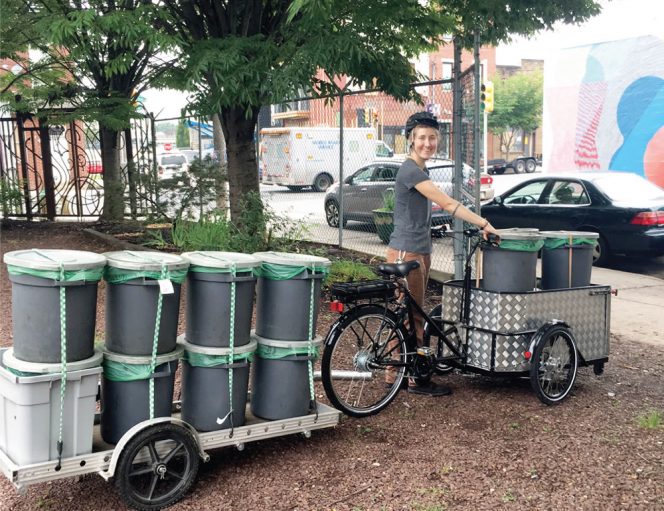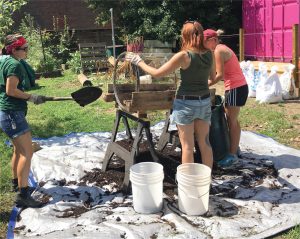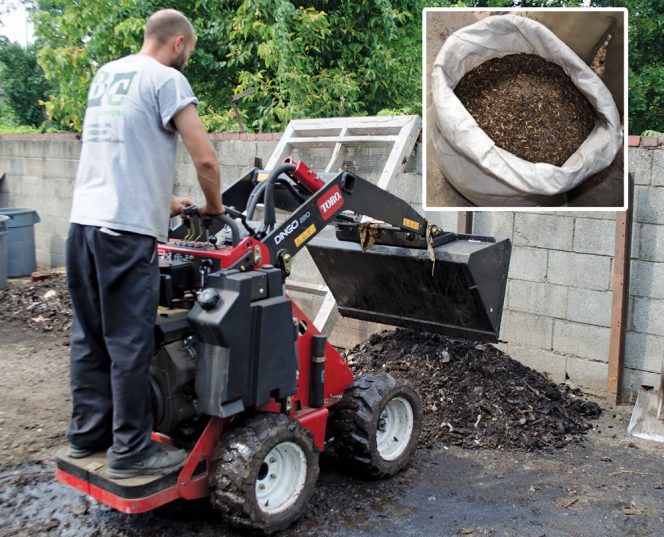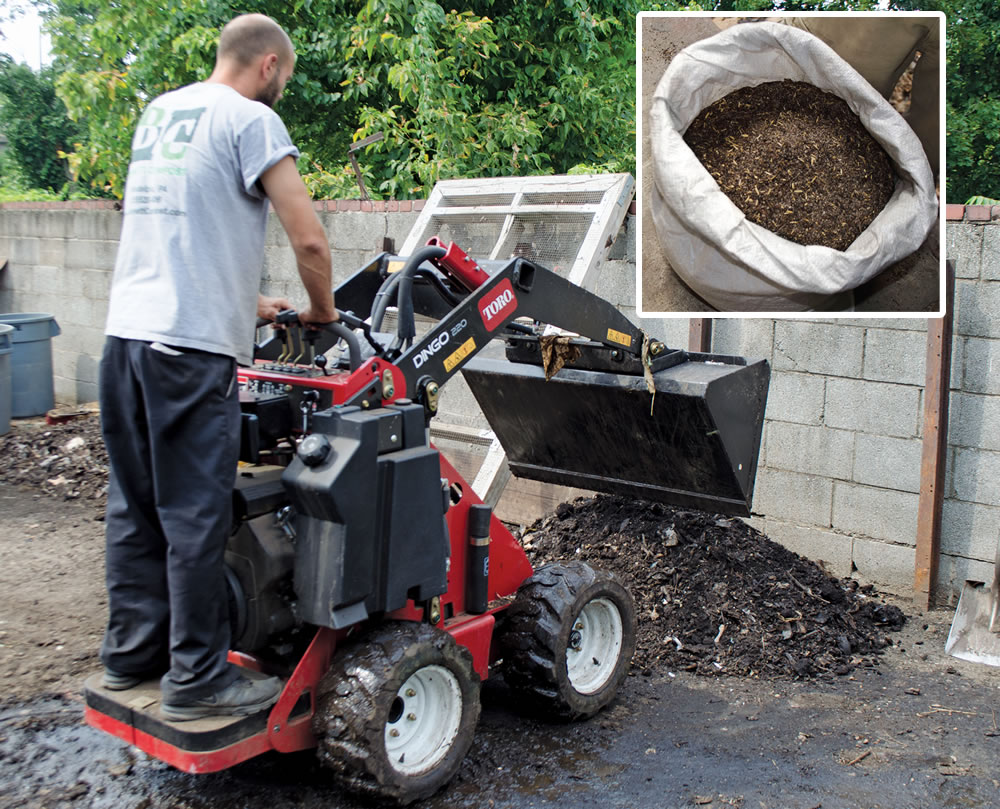City Sprouts and Bennett Compost service households and businesses with food scraps collection, and compost most of the organics at their small-scale operations.
Nora Goldstein
BioCycle October 2016

The tricycle has enabled City Sprouts to almost double the capacity it can collect on one commercial organics route. Emma Wiggans collects the organics on Mondays and Fridays. Photo courtesy of City Sprouts
The composting operation is located on a corner property (at one time a garden center) that is owned by the New Kensington Community Development Corporation (NKCDC). Philly Compost had collaborated with NKCDC to start The Compost Coop in 2011. The 2,000 sq. ft. site has two Earth Tub in-vessel composting units, along with an area for curing, screening and storing compost.

Working members of The Compost Coop help build a second trommel sifter. Photo courtesy of City Sprouts
Trike Collection
The most recent development at City Sprouts is acquisition of a tricycle for its commercial organics collection route. “We have 17 commercial customers, and will probably get up to 20 by the end of 2016,” says Mastalerz. “We received an $8,000 small business grant from The Merchant’s Fund in Philadelphia to purchase the tricycle, which is made by Nihola in Demark. This has enabled us to almost double the capacity that we can collect on one route.”
The front of the tricycle has a ramp that is used to load up to six 10-gallon containers. The trailer pulled behind can hold up to 8 containers. “Collection is so much more stable using the tricycle, which is low to the ground,” she adds. “The bicycle would tip over a lot while loading the trailer. And the trike is equipped with electric-powered assist, which is glorious! We also expect it will be much easier to maneuver in winter weather.”
Both pre and postconsumer food scraps are collected from commercial businesses. The 10-gallon containers are lined with certified compostable BioBags. A City Sprouts’ employee collects the organics on Mondays and Fridays. About 500 gallons/week of organics are collected on the commercial route, including a fairly large quantity of coffee grounds. The majority of these materials are composted off-site (i.e., not in the Earth Tubs).
“Contract” Collecting
Since City Sprouts acquired the tricycle, Mastalerz has started to collaborate with vehicle-based food scraps collection services in Philadelphia. “Jen got in touch after the trike was ordered to see if Bennett Compost would be interested in using City Sprouts to offer residential food scraps collection in its neighborhood,” explains Tim Bennett, founder and owner of Bennett Compost, a food scraps collection and composting service in Philadelphia. “We agreed to give it a try and for the last couple of months, City Sprouts has been servicing our residential customers in the Fishtown and Kensington neighborhoods with weekly food scraps collection. Bennett Compost picks up material from this route and brings it to our composting site. It allowed us to add additional customers without adding an additional vehicle.”
Mastalerz adds that residential collection can be easier to maneuver on the tricycle versus using a small transit van: “Even with the trike it can be tricky. There are a couple streets that dead end and we have to do a K-turn to head back out. We also have the flexibility to go the wrong way on a one-way street to increase route efficiency.”
Bennett Compost
Tim Bennett started Bennett Compost in 2009 while working at a Small Business Development Center in Philadelphia. He had always wanted to divert his food scraps to composting, but collection wasn’t offered to city residents. Surrounded by people who wanted to start small businesses, Bennett decided to give entrepreneuring a try himself, and created a food scraps collection enterprise. “I had no idea how the service would catch on, but decided to give it a shot,” he recalls. “For the first 11 months or so, I would rent a pickup truck from Philly Car Share, and do the collections before and after work. About a year after starting, I left my job, bought a van, and became a full-fledged small business owner.”

Bennett Compost uses a Toro stand-behind mini skid steer loader to help manage the aerated static piles. A portion of the compost and soil blends (inset) produced are given back to customers as a benefit. Photos courtesy of Bennett Compost
Originally, Bennett Compost used a network of community gardens in Philadelphia to compost collected organics. It would build and maintain the bins, and give the gardens a portion of the finished compost. Residents near some of the community gardens would bring their food scraps to be composted.
To consolidate its composting operation, the company decided to rent space and build a small aerated static pile (ASP) composting site. “There is a concrete pad, and we have a couple thousand square feet for our operations,” notes Bennett. “We purchased a Toro stand-behind mini skid steer loader to manage the piles, and rent a portable screen as needed to process the finished compost for sale and to distribute to our residential customers. With the ASP process, we can take in small amounts of certified compostable products and bin liners.”
Bennett Compost also offers commercial organics collection, doing pick ups 1 to 3 times per week. It provides various sized containers — from multiple 5-gallon buckets up to 35-gallon bins. Commercial organics are brought to a farm for composting. “We have 30 to 35 commercial customers right now,” he adds.
Bennett no longer wonders whether his residential collection service will catch on. “When we are out doing collection and see our customers, they tell us how much they love the service,” says Bennett. “And the momentum is building. There are definitely more people who want access.”










